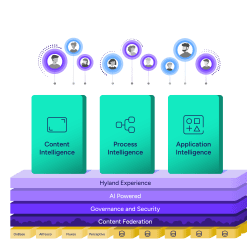The Royal Marsden Hospital
Leading global cancer hospital increases clinical and administrative efficiencies by enabling a complete digital patient record.
The challenge
Like many hospitals across the National Health Service, The Royal Marsden is in the midst of a digital transformation journey with an end goal to eliminate paper, improve clinical and administrative workflows, optimize patient care and support research. The Royal Marsden realizes this shift will require much more than the purchase of a new electronic patient record (EPR) platform. Therefore, the hospital is taking a phased approach to digital transformation — one in which OnBase, Hyland Healthcare’s enterprise information platform, plays an integral part.
The solution
The first phase of The Royal Marsden’s digital transformation is enabling electronic document management (EDM) in core areas of the hospital and integrating these capabilities with its existing homegrown EPR. The hospital began by rolling out OnBase in its Rapid Diagnostic and Assessment Centers (RDACs). These clinics serve as one-stop shops where patients with suspected cancer come to receive testing, diagnosis and treatment options on the same day.
The processes and workflows that drive care at the RDACs are very paper intensive. The Royal Marsden believes digitizing this documentation first and linking it to its existing EPR produces the greatest efficiencies for the hospital and serves as a good use case for other departments to follow. Lisa Emery, chief information officer at The Royal Marsden, also believes linking electronic documents to the hospital’s existing EPR will aid in the eventual transition to a new EPR product.
“Our goal is to create a mind shift at The Royal Marsden where we get clinicians and administrative staff to start digitizing content and accessing this information electronically long before we implement a new EPR,” Emery said. “This way, when we cut over to a new EPR, the staff will be used to accessing documents and images in this way and it will streamline change management.”
The impact of this effort has been significant, particularly for administrative staff and clinicians.
“The people who see the impact of OnBase on a day-to-day basis are the clinical administrative staff,” said Marcus Thorman, chief financial officer at The Royal Marsden. “It’s transformed the way they work. They no longer have to handle individual paper records for individual patients. They are no longer losing pieces of paper, seeing documents go missing or forever chasing after stuff. It’s all there digitally in the system.”
Clinicians have gained the benefit of a more complete view of the patient.
“There’s an absolutely vast array of information that needs to be incorporated into an EPR to make sure the clinician is fully aware of everything that is contributing to the patient’s disease and should be contributing to the patient’s treatment,” said Dr. Tim Wigmore, consultant, intensivist and former chief clinical information officer at The Royal Marsden. “This includes everything from test results to echo images to MRIs and more. OnBase provides a single pane of glass that brings all of this together in one place in a structured fashion that is easily searchable.”
(OnBase has) transformed the way they work. They no longer have to handle individual paper records for individual patients. They are no longer losing pieces of paper, seeing documents go missing or forever chasing after stuff. It's all there digitally in the system.
— Marcus Thorman, Chief Financial Officer, The Royal Marsden
The advantages of OnBase
- Complete view of the patient
- Reduced administrative burden/paper handling
- Remote team collaboration
- Streamlined change management









